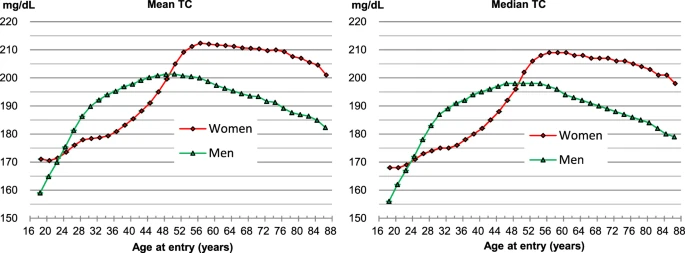Summary - Total cholesterol and all-cause mortality by sex and age
Key points from the text :
https://www.nature.com/articles/s41598-018-38461-y

Key Findings
- U-shaped relationship: The study found a U-shaped relationship between total cholesterol (TC) levels and mortality. This means that both very low and very high TC levels are associated with higher mortality rates.
- Optimal TC range: The study suggests that the optimal TC range for overall survival is between 210-249 mg/dL for most age groups, except for younger adults.
- Age and sex differences: The optimal TC range varies by age and sex. Younger adults (18-34 years) have lower optimal TC ranges, while older adults have higher optimal ranges.
- Low TC levels not always good: The study found that TC levels below 200 mg/dL may not necessarily be a sign of good health. In fact, low TC levels were associated with higher mortality rates in some age groups.
Implications
- Cholesterol guidelines: The study suggests that current cholesterol guidelines, which recommend a TC range of <200 mg/dL as desirable, may not be applicable to all populations.
- Diseases associated with low TC: The study highlights the need to identify and manage diseases associated with low TC levels, which may improve survival rates.
- Individualized approach: The study suggests that a more individualized approach to managing cholesterol levels may be necessary, taking into account age, sex, and other factors.
Limitations
- Medication use: The study did not account for the use of lipid-lowering medication, which may have affected the results.
- Limited generalizability: The study was conducted in a Korean population, and the results may not be generalizable to other ethnic groups.
